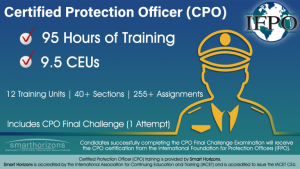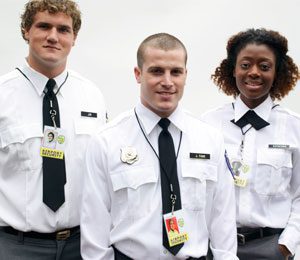From about 1993-1996, I worked as a security officer at Rhode Island Hospital in Providence, RI. I never actually worked for the hospital per se -- I was employed by whatever security company had the contract with the hospital during that time. I believe in those years, the contract switched hands probably three times. In addition to its cadre of contract workers, the hospital did in fact have its own small force -- the director, his deputy, a few dispatchers and transport vehicle drivers. It's my understanding these positions carried with them higher wages and benefits that other hospital employees enjoyed. The majority of the force -- the contract workers -- were screened by the contracted company and earned far less. The hospital security director communicated with the security company, but as far as hiring, paying and all of those other things associated with contract workers, the hospital, to my knowledge, was not directly involved. -- Ted Czech, IFPO.
By Ed Finkel, SecurityMagazine.com
Corporations, universities and other institutions have faced the question of whether to outsource or not to outsource for decades when it comes to physical security and more recently on the cybersecurity side. There has never been one right answer for everyone, and sometimes the answer to the question is, essentially, “Yes.”
Boeing once used a proprietary guarding force, moved to a mix of in-house and contracted guarding about 20 years ago, and today the enterprise has a 100-percent contracted security environment, with a force of about 1,200 from Allied Universal. But David Komendat, Vice President and Chief Security Officer at Boeing, says it isn’t a one-size-fits-all formula.
Are you ready? Launch your career in security with a CPO certification
“Each enterprise has a different protection strategy and philosophy on what works for them,” he says. “Enterprises have unique security cultures. We reached the conclusion that contract enterprises are better able to recruit, evaluate and train professional security officers, and do it at a scale that’s hard for a private enterprise to replicate when a large force is required. Guarding enterprises have dedicated infrastructure in place to manage those processes much more efficiently than private enterprises.”
Drexel University in Philadelphia has a mix of 46 full-time, sworn police officers; 16 university employees who work as dispatchers; and 135 unarmed security officers contracted from Allied Universal. Eileen Behr, Vice President of Public Safety and Police Chief, says that blend has been in place since before her time at Drexel.
“The ability to have Allied Universal assist us in managing that unarmed security staff is an asset,” she says. “Anytime we need additional officers or replacements, they have the ability to backfill for us. For instance, if there’s a large event like commencement or a large concert, we have access to those security officers trained by Allied.”
Read the rest of the story here.
________________________________________________________________________________________________________
_______________________________________________________________________________________________________

Get certified and take your security career to the next level!
The International Foundation for Protection Officers (IFPO) is dedicated to providing meaningful and cost effective security training for security guards and protection officers.
We believe that education is a necessary and essential part of professional security training and the security officer’s background. IFPO serves individuals, security companies, and organizations that have their own private security staff. Our students and members benefit from the recognition and standing that the prestigious IFPO certification conveys.
LIKE and FOLLOW the IFPO on Facebook!
International Foundation for Protection Officers Mission Statement
Mission Statement Part I.
The International Foundation for Protection Officers provides professional learning opportunities for security practitioners, to impart the knowledge, skills, and competencies required to maximize job performance and enhance career potential.
Purpose: to make a positive difference in the quality of the participant’s job performance and elevate the professional status of students who partake of our learning opportunities.
Business: to supply committed security practitioners with a quality education to help achieve their highest potential and provide recognized accreditation for successful completion of educational goals.
Values: commitment, integrity, responsibility, and standards of excellence, provide the platform that supports our journey as we pursue our mission.
Vision Statement
Commitment to Excellence: To be the recognized center of excellence and primary provider of education and training products and services to the security industry.
Mission Statement Part II.
“The International Foundation for Protection Officers is committed to the support and professional development of protection officers and supervisors. Through advocacy, promoting training standards, and providing accessible training, education and certification opportunities, we seek to enhance their professional standing as well as increase and diversify the value of the vital services they provide.”


